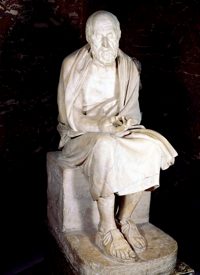
Give Herodotus his due: the fifth-century B.C. Greek historian had a far better understanding of the history of his age than many modern historians have been prepared to credit to him.
The Roman statesman and philosopher Cicero called Herodotus the “father of history,” but historians have not been so kind. But now a discovery in the Egyptian desert is proving that once again, the father of history got it right. According to a story at FoxNews.com:
A pair of Italian archaeologists have uncovered bronze weapons, a silver bracelet, an earring and hundreds of human bones in the vast desolate wilderness of the Sahara desert. Twin brothers Angelo and Alfredo Castiglioni are hopeful that they've finally found the lost army of Persian King Cambyses II.
According to the Greek historian Herodotus, Cambyses II and his armies were buried by a cataclysmic sandstorm in 525 B.C. He wrote, "a wind arose from the south, strong and deadly, bringing with it vast columns of whirling sand, which entirely covered up the troops and caused them wholly to disappear."
Now the discovery of these artifacts points towards an answer to this millennias-old mystery: The Castiglioni brothers studied ancient maps and came to the conclusion that Cambyses' army did not take the caravan route most archaeologists believe they used.
"Since the 19th century, many archaeologists and explorers have searched for the lost army along that route. They found nothing. We hypothesized a different itinerary, coming from south," Castiglioni said.
The Castiglioni brothers careful analysis of artifacts and bones found at the site have demonstrated a clear link to the ancient Persian army. The work has not been easy — 13 years of research and five desert expeditions — but the result has been discoveries that lend credence to a story that many scholars had been prepared to dismiss as legend simply because the route chosen by the ancient army did not match modern presumptions of where they would have traveled.
Such discoveries call to mind the labors of Heinrich Schliemann, who, contrary to the presumptions of archaeologists and historians of his own generation, believed in the existence of the ancient city of Troy and the essentially factual description of that city provided in Homer’s Iliad. Of course, modern archaeologists have their revenge on Schliemann’s presumption by assaulting his destructive archaeological techniques, but he was still the first in a series of mavericks who have overturned the presumptions of those who have sought to disparage the veracity of the ancients.
Contrary to modern presumptions, ancient accounts of history, often written by contemporaries — or at least by those who were certainly far closer to events and witnesses to those events than scholars twenty centuries removed from them — are upheld in many details and provide an invaluable documentary evidence to accompany findings of archaeology.



